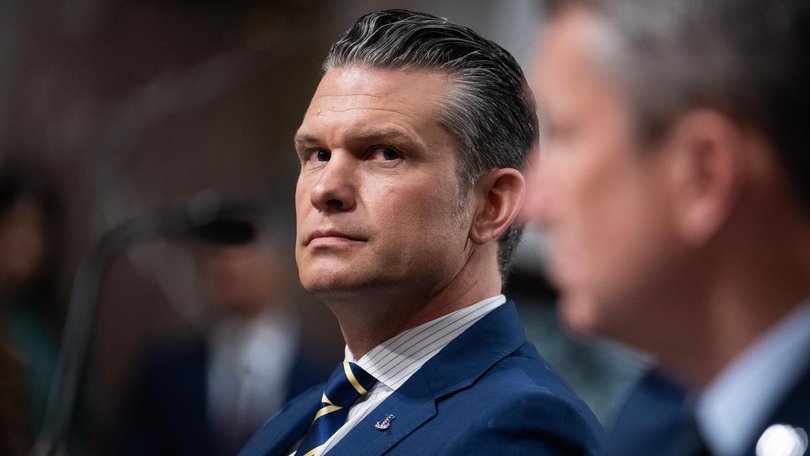Pentagon demands journalists pledge to not obtain unauthorised material
The Trump administration is cracking down on journalists at the Pentagon, demanding they pledge not to gather any information - even unclassified - that hasn’t been expressly authorised for release.

The Trump administration unveiled a new crackdown Friday on journalists at the Pentagon, saying it will require them to pledge they won’t gather any information - even unclassified - that hasn’t been expressly authorized for release, and will revoke the press credentials of those who do not obey.
Under the policy, the Pentagon may revoke press passes for anyone it deems a security threat. Possessing confidential or unauthorized information, under the new rules, would be grounds for a journalist’s press pass to be revoked.
“DoW remains committed to transparency to promote accountability and public trust,” the document says, using an acronym for the newly rebranded Department of War. “However, DoW information must be approved for public release by an appropriate authorizing official before it is released, even if it is unclassified.”
Sign up to The Nightly's newsletters.
Get the first look at the digital newspaper, curated daily stories and breaking headlines delivered to your inbox.
By continuing you agree to our Terms and Privacy Policy.For months, Defense Secretary Pete Hegseth and his staff have been tightening restrictions on Pentagon reporters while limiting military personnel’s direct communication with the press. Like many defense secretaries before him, Hegseth has been deeply irritated by leaks. His staff this year threatened to use polygraph tests to stop people from leaking information, until the White House intervened.
The 17-page document says media that wish to report from the Pentagon have to sign agreements restricting their movement in the building and stipulating that they not obtain or possess unauthorized material.
Those who refuse to sign the new policy will be stripped of or denied permanent credentials to cover the Pentagon.
In a Friday post on X, Hegseth said that “the press is no longer allowed to roam the halls of a secure facility,” and that reporters would have to “wear a badge and follow the rules - or go home.”
The vast majority of the Pentagon’s information has some level of sensitivity. For example, even the initial planning efforts for June’s parade marking the Army’s 250th anniversary - including how many tanks the Army would drive past President Donald Trump’s review stand - was initially categorized as “CUI,” or for “Controlled Unclassified Information,” which would be barred from public access under the new rules.
The agreement represents a sharp departure from the practice over decades of military and civilian defense leaders who have felt comfortable openly talking to and even going into war zones with the press.
Pentagon spokesman Sean Parnell said in a statement Friday that the new policy “reaffirms the standards that are already in line with every other military base in the country.”
“These are basic, common-sense guidelines to protect sensitive information as well as the protection of national security and the safety of all who work at the Pentagon,” he added.
Katie Fallow, deputy litigation director at the Knight First Amendment Institute at Columbia University, said the new policy is part of “the Trump administration’s broader assault on free speech and press freedom.”
“A reporter who publishes only what the government ‘authorizes’ is doing something other than reporting,” she said.
The National Press Club condemned the decision in a statement. “If the news about our military must first be approved by the government, then the public is no longer getting independent reporting,” said Mike Balsamo, the organization’s president. “It is getting only what officials want them to see. That should alarm every American.”
The White House declined to comment.
In February, Hegseth kicked out several long-standing Pentagon news organizations from their dedicated offices there, including NBC News, the New York Times and NPR, to rotate in new, conservative outlets, including OAN, Newsmax and Breitbart, as well as the left-leaning HuffPost. The radio booth vacated by NPR remains unused.
When bureau chiefs from many of the outlets banded together to urge Hegseth’s staff to reconsider the changes, the officials doubled down and removed additional media outlets, including The Washington Post, from their Pentagon desks.
In the past several months, additional restrictions have been placed on the media, including that no reporter can go beyond certain hallways without an Pentagon staffer as an escort.
The briefing room itself - which until last year saw regular, twice-a-week televised question-and-answer sessions with the Pentagon press secretary or his deputy - has gone dark. Reporters are not allowed to use it for TV hits, and Hegseth’s chief spokesman, Sean Parnell, and his press secretary, Kingsley Wilson, hardly ever conduct media briefings.
The Trump administration has long attempted to curb press access to government institutions - though the president has primarily concerned himself with reporters on the other side of the Potomac, covering him in the White House.
During Trump’s first term in office, both Jim Acosta and Brian Karem, White House correspondents for CNN and Playboy, respectively, won victories in court after the White House stripped their press passes.
At the start of his second term, the White House excluded the Associated Press from certain administration events and the rotating press pool over a refusal by the newswire - also the news industry’s stylistic standard bearer - to call the Gulf of Mexico the “Gulf of America.” That case continues to play out in federal court.
In the Pentagon press room, there’s a wall of photographs under metal lettering that reads “Pentagon Correspondents” with the faces of the men and women who cover the Defense Department for the major news outlets.
On Friday, all 30 slots for photographs were empty.
Stuck haphazardly with two pieces of Scotch tape was a single 8.5-by-11-inch sheet of printer paper that read: “CURRENTLY BEING UPDATED.”
- - -
Grace Moon contributed to this report.
© 2025 , The Washington Post
